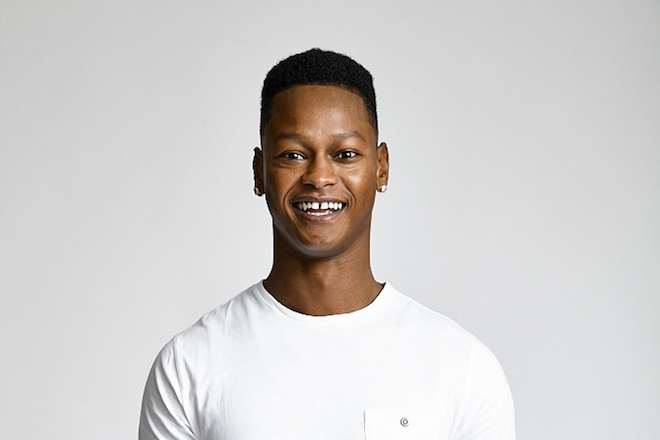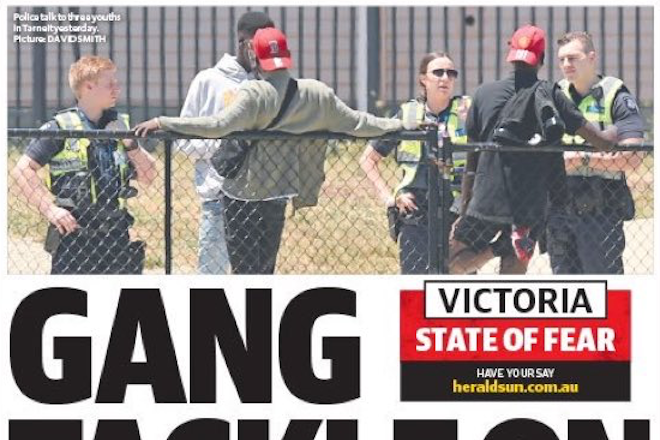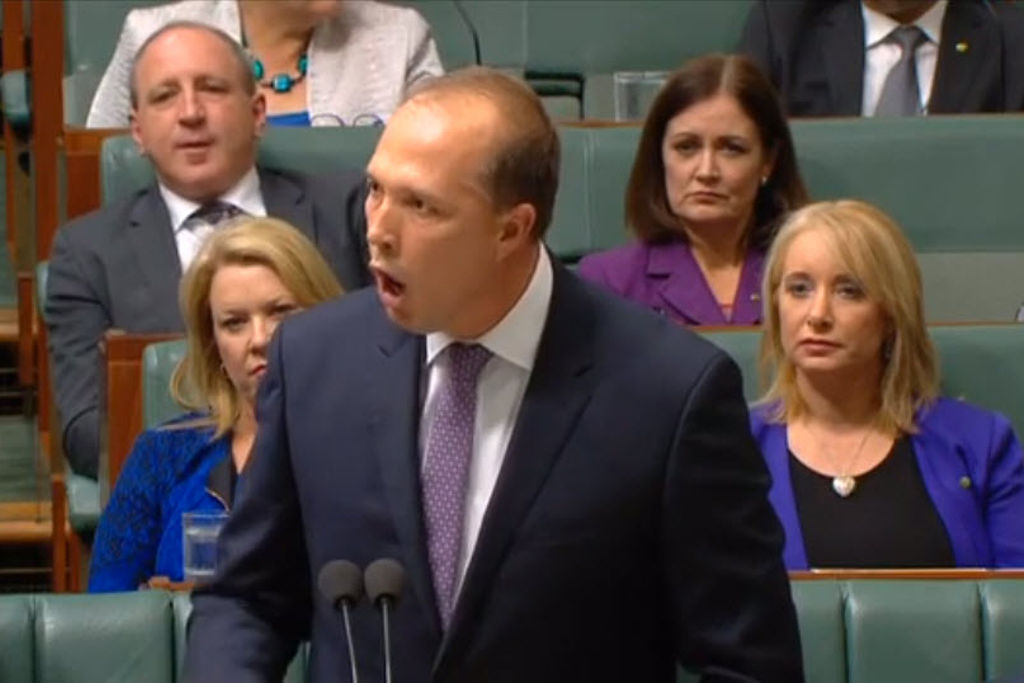Nelly Yoa, And The Media’s Infatuation With Contrarian “Community Leaders”
The meteoric rise and fall of Nelly Yoa exposes a bigger problem with the Australian media.

When politicians started losing their minds about the supposed ‘African gang crisis’ plaguing Melbourne, there was one “prominent” member of the South Sudanese community the media couldn’t get enough of: 29-year-old footballer and volunteer Nelly Yoa.
The gang crime stories really started to pick up their pace on New Years Day, after federal health minister Greg Hunt and Prime Minister Malcolm Turnbull criticised the Victorian Labor government for its apparent inaction over the “crisis”.
Yoa, who in 2011 was the victim of an alleged gang attack, appeared on radio, TV and in numerous print articles decrying the “politically correct” line taken by police and the state government in failing to tackle gang crime.
Unlike other vocal members of the Sudanese community in Melbourne, who were calling on politicians and journalists to refrain from divisive and racist rhetoric, Yoa was adamant there was a problem with African gangs and called on the police to take it more seriously. He told Melbourne radio station 3AW that “we have problems in our community” and accused the South Sudanese community of “horrendous behaviour”.
The media couldn’t get enough of Yoa. Here was a member of the South Sudanese community who was contradicting the line put forward by other community leaders. His arguments aligned neatly with what the Herald Sun and conservative commentators and politicians were saying, and as an African migrant they figured he was immune to the criticisms levelled against right-wing politicians and commentators.
The Age published an opinion piece by Yoa in which he said there was “a major issue among young South Sudanese people in Melbourne”, citing his experiences volunteering with criminal offenders. As the media focus on the gang crisis ramped up Yoa was also quoted by the ABC, SBS, Sky News, The Australian and The Guardian.
But now Yoa’s history, background and experience, especially in relation to working with young members of the African community, has been called into question. And it’s only now, a week after Australia’s biggest and most influential media outlets gave him a powerful platform, that the truth is coming to light.
Community Leaders Say Yoa Doesn’t Speak For Them
When Yoa first hit the news earlier this year Richard Deng, from the South Sudanese Community Association in Victoria, told the Herald Sun that his comments were unhelpful and unrepresentative, because Yoa wasn’t actually in touch with the community. But most media outlets ignored Deng and continued to publish Yoa’s commentary.
Yesterday Deng and Kot Monoah, the chairman of the South Sudanese Community Association in Victoria, told Fairfax they had spoken to people working at the organisations Yoa allegedly volunteered for, as well as parents and young offenders, and couldn’t find any evidence Yoa had done any of the mentoring or youth work he purported.
“Nelly is not closely associated with the community and his recent comments to the media outlets can only be interpreted as carrying no weight whatsoever or any endorsement from the community,” Monoah said.
Yoa’s Entire Background Has Been Questioned
But it gets even more intriguing. Yoa was regularly described as an “elite-level” soccer player, and in his opinion piece in The Age he said he trialled with the Chelsea football club and Queens Park Rangers in the UK. He also said he was currently training with an unnamed AFL team.
Soccer fans on Twitter set out to expose Yoa’s claims as bogus.
“Sudanese-born elite soccer player and aspiring AFL footballer Nelly Yoa”
lmao he’s done it again. i’m more of an elite soccer player than Nelly Yoa https://t.co/KP50dkhdgf
— Vince Rugari (@VinceRugari) January 6, 2018
Queens Park Rangers confirmed to AAP that Yoa had never been associated with them and Melbourne City, and another football club Yoa claimed to have trained with, said the same thing.
In a bizarre twist, Yoa’s alleged contract with Melbourne City was reportedly the basis of a lawsuit launched against rappers Ty Dolla $ign and YG by Yoa, after an alleged physical altercation in a Melbourne nightclub. Yoa told TMZ in 2016 that lawsuit resulted in a $100,000 settlement paid by the two rappers, though they never confirmed those details.
Fairfax has also reported on Yoa making up a phone call from Malcolm Turnbull, who apparently congratulated him on his article. According to Turnbull’s office that call never occurred. Yoa then claimed he had spoken to a representative from the PM’s office.
And Now He’s Accused Of Plagiarism
Yoa’s credibility has taken an even bigger plunge, with Twitter yet again exposing the fact that his initial opinion piece in The Age bears a striking resemblance to another online article.
if you google most sentences in Nelly Yoa's "constructive solutions" they are word for word copied @smh @theage pic.twitter.com/7OEBSNq17c
— Susan Metcalfe (@susanamet) January 7, 2018
Yoa denied the plagiarism allegations to The Australian and said “I didn’t even see [the original article] and all I can say is that what I have written is based on my experience and what I think could be implemented”.
He has also posted a statement on Twitter, again claiming to have trialled with the Queens Park Rangers and threatening various media outlets with defamation.
The Australian Media Loves Contrarian Characters Like Yoa
The Nelly Yoa incident is a prefect demonstration of the media getting so excited about finding a “community leader” who says things contrary to other members of the community that they put him on a pedestal and broadcast his views to millions, without stopping to check the veracity of his claims, background and experience.
It’s not the first time something like this has happened. Last year the Australian media fell in love with Mohammad Tawhidi, the so-called “imam of peace” whose views were reported on commercial TV, radio, and Australia’s most read news websites. Like Yoa, Tawhidi took a stance counter to that of most other leaders in his community — he backed Pauline Hanson’s call to curb Muslim immigration, for example.
But despite being repeatedly referred to in the media as a “Sheikh” and “imam” he… isn’t one. And despite being put forward by shows like Sunrise as an expert on Islam and terrorism, he is not recognised as an imam by the Australian National Imams Council and he has no affiliation with any mosques.
That didn’t matter to TV producers and news editors who didn’t bother doing the necessary background checks on the person they were putting in front of millions of people. All they cared about was the fact that they had someone, who apparently represented the Muslim community, backing up the likes of Pauline Hanson. A Muslim who wants Muslim immigration restricted? Put him on TV immediately!
Yoa’s bona fides aren’t entirely confected — he met with Victorian Premier Daniel Andrews in 2016 and is featured on the Victorian Multicultural Commission’s website — and he is of course entitled to his views on alleged African gang violence. But one man’s views shouldn’t be presented as equal to the large swathes of the South Sudanese community, including its many leaders, who say the current hysteria is doing more to harm than help.
Alex McKinnon has already discussed the reasons behind Tawhidi’s popularity amongst sections of the media. “In a media environment increasingly dominated by outrage and political division, being a self-defined contrarian has become a sure-fire way to secure TV appearances, column inches and just enough cheap notoriety to keep your name in lights,” he wrote last year.
Depressingly, rather than learning from the Tawhidi experience the Australian media has doubled down. Yoa is proof of that. The desperation for both contrarianism, and someone who is willing to beat up on migrant communities but doesn’t look like the usual suspects in the conservative commentariat, trumps any any sense of truth and accuracy.
–
Feature image via Facebook

